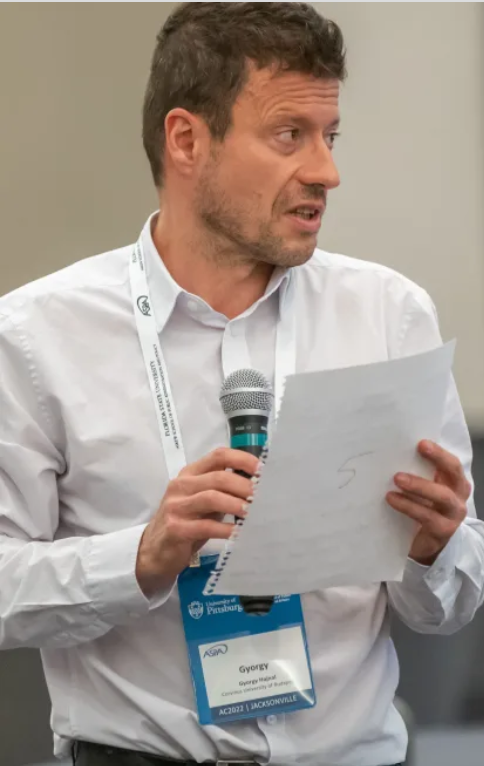Human rights, democracy, and academic freedom: American recommendation worked out with the involvement of our researcher

The American Society for Public Administration (ASPA) – the national academic organisation in the United States for academic institutions and researchers of public administration, public policy and public management – set up an expert committee last January to provide the researchers of the area with guidance for the management of sensitive situations occurring in the course of international engagement. The report published this January was preceded by a discussion paper that was further improved by the members of the committee at the meetings of international conferences last year. In the several-month work of the committee of nine and in the production of the report – as the only European – professor György Hajnal, Head of the Public Policy Department of the Corvinus, researcher professor of the Research Institute of Social Sciences, was involved.
A significant part of international engagement has been going on in international space for a long time, but over the past years, there has been a higher number of cases when a researcher or an assessment committee of a journal had to face serious moral and ethic dilemmas in such international cooperation. A few specific cases from the past years, which made the researchers of the public administration, public policy and public management professional areas to carry out lengthy assessments:
- Associations have planned to hold conferences in jurisdictions where it is claimed that human rights are not adequately respected. Members have protested about these decisions, arguing that they may be maltreated if they attend a conference, or that attendance may be construed as an endorsement of government policy. In a few instances, conferences have been cancelled or relocated in response to such protests.
- International accrediting bodies are asked to accredit degree programs in countries with governments that are accused of human rights abuses and infringements of academic freedom. Accrediting bodies do not appear to have clear procedures for weighing these factors while making accreditation decisions.
- Journals sometimes receive manuscripts from scholars working in jurisdictions where academic freedom is not respected. But journals appear to lack procedures for determining whether research is compromised for this reason, or responding appropriately in cases where research appears to be compromised. Recently, journals have debated about whether to accept manuscripts from Russian institutions whose leaders have publicly endorsed the invasion of Ukraine.

Universities sometimes partner with institutions in jurisdictions where human rights and academic freedom may be threatened. Controversies about such partnerships have sometimes arisen.6 In some instances, universities have lacked policies that explain how teachers and students will be protected, or standards for determining whether partnerships have the effect of legitimizing government policies. The ASPA has worked out its recommendation titled „President’s Committee on International Scholarly Engagement” (PCISE) to manage the above cases, offering a framework instead of rigid rules to manage sensitive issues occurring in international engagement. The recommendations are based on the concept that each case is unique, so assessment and the consideration of facts and arguments for and against cannot be skipped before making a decision. An institution is able to act cautiously in such cases if it identifies and records in advance the values that are important for it in international engagement. A number of universities have worked out their own guidelines or codes of conduct recently, offering assistance to researchers in international engagement. Although their contents are fairly different, almost each document defines the basic values that are important for the given institution and presents good practices to manage international engagement. Most of them have set up offices or committees, too, to enforce the principles of the institutions in international engagement and to give advice to lecturers and researchers for the management of complex issues.
The report of the ASPA committee identifies 6+1 basic values which should be considered by the scientific organisations of the professional area in decision-making, as well as in the definition of the guidelines of the institution:
- promoting dialogue and understanding the points of view of researchers working in legal systems different from ours;
- protecting academic freedom and
- respect for human rights in the course of international engagement;
- support the development of scolarly capacity;
- respect the for the self-determination of communities;
- protecting the safety and dignity of colleagues;
- accuracy, fairness, and transparency in decision-making in the management of controversial situations.
Finally, the report identifies four specific recommendations, too, which can be applied by any scientific organisation that is active in the area of public administration:
- Organizations should have an open conversation about the values that guide their international engagement, and they should publish a statement of their core values and processes for ensuring their expression in the policies and practices of the organization. Then the values identified in the conversations and the related processes should be recorded in writing, too.
- Organizations should assure that staff and volunteers are familiar with the core values that guide engagement, and assure that these values are explicitly accounted for in key decisionmaking processes within the organization
- Academic organizations should consider appointing an individual or committee with responsibility for reviewing organizational activities to determine whether core values are respected, and receiving and responding to concerns about potentially problematic cases of engagement
- Procedures for addressing concerns about engagement should be designed to assureaccuracy, fairness, and transparency in decision-making.
As part of a series of dissemination events the Report and the issues and developments it tackles will be discussed at the Opening Plenary Session of the 2023 Annual Conference of the International Research Society for Public Management (IRSPM) in Budapest, at Corvinus university on 3-5 April. The „Panel Discussion on International Engagement: Respecting human rights and academic freedom” will comprise several current and former leaders of global and regional academic networks, including Corvinus professor György Hajnal, member of PCISE and Chair of the IRSPM 2023 Annual Conference.